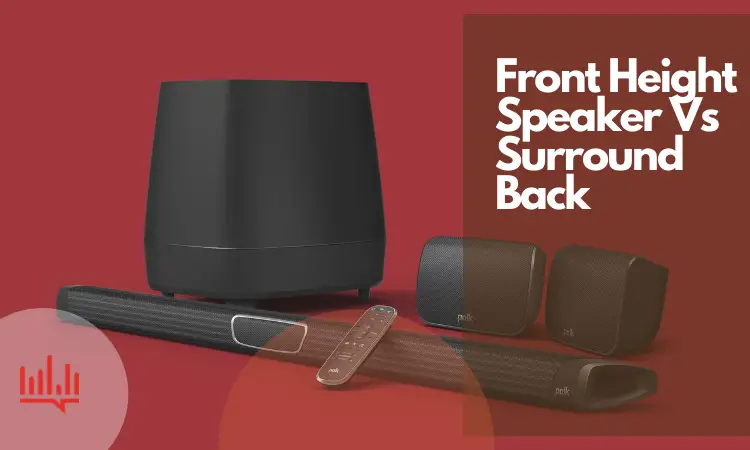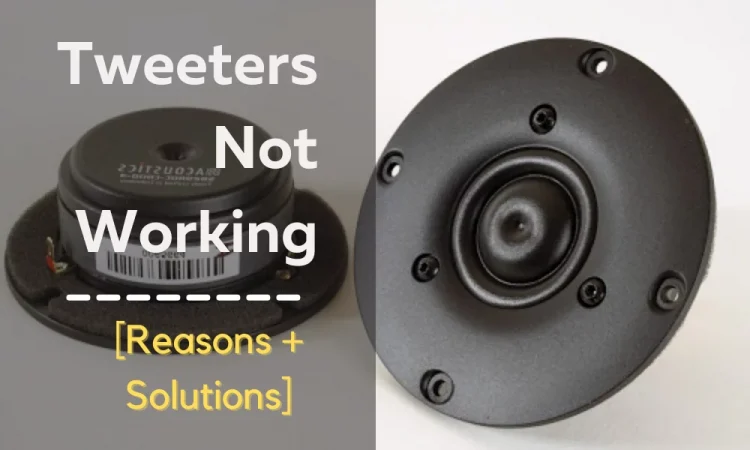As home speakers generally sit on a well-protected surface, they tend to last quite long. However, you still might want to be extra sure about longevity.
So, how long do home speakers last?
Home speakers can sustain up to 40-50 years, relying on the materials used and the environmental factors. However, speakers with cheap materials have a shorter lifespan. Some speaker components deteriorate faster than others. So, when these parts deteriorate, the speakers’ overall audio quality decreases.
Now, in the following section, I’ll go through how long each sort of house speaker lasts. Along with maintenance advice, I’ll try to cover the components of a speaker that wear out over time.
So, let’s get down to business without wasting any time.
Typical Lifespan of Home Speakers: A Quick Survey
The average lifespan of home speakers varies greatly depending on their type and brand. A key element in this is how it is maintained. Before we get into the specifics of home speaker longevity, let’s take a look at the results of a survey we conducted on speaker lifespan.
We questioned a number of customers who used various brands of speakers in their homes. What kind, length of time used, and frequency of music playback through these speakers were the questions of this survey
| Type Of Speaker | Lifespan(Moderate Use) | Percentage of People |
| Home Speakers | 16-20 Years | 85 % |
| Home Stereo Speakers | 11-15 Years | 50% |
| In-wall Speakers | 11-15 Years | 70% |
| Ceiling Speakers | 16-20 Years | 75% |
| Floor Standing Speakers | 11-15 Years | 80% |
| Surround Sound Speaker | 10-15 Years | 75% |
| Soundbar | 6-10 Years | 87% |
| Bookshelf Speaker | 15-20 Years | 65% |
So, what should you anticipate how long your home speakers will last?
As long as they are taken care of, cheap speakers should typically last up to 5-8 years. High-quality speakers have a substantially longer lifespan. If they receive proper maintenance, they potentially last for a lifetime. Some speakers continue to perform really well without any repairs for 30-50 years.
But most of these speakers do need replacement from time to time. Most likely, you’ll need to replace the cones and surrounds.
Longevity According to Types of Home Speakers
Home speakers have a minimum of 3-5 year lifespan. Due to heavy use, sound bars usually last this short period of time. In contrast, you can anticipate a maximum lifespan of 30 years.
Both Klipsch and KEF brand speakers have a long lifespan. But this 30-year timeline is from an older speaker brand, Bowers and Wilkins. Here’s a piechart based on the response of the consumers –
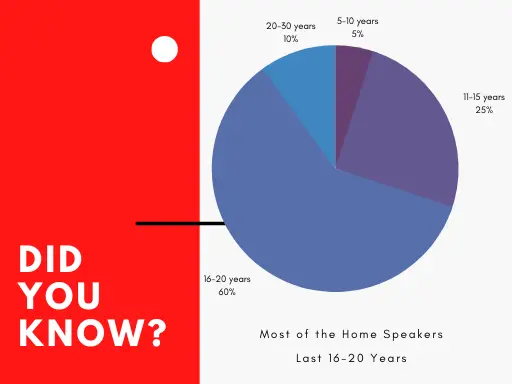
Let’s delve more deeply into the speaker’s longevity and brand variation that is expected from them.
How Long Do Home Theater Speakers Last?
Home theatre speakers can last up to 20 to 30 years with high-quality components and regular maintenance. But as technology develops, after 10 years of use, you might run into compatibility issues.
With new high-resolution devices and HDMI standards, home theatre speakers may need to be replaced every 7-10 years. Nevertheless, any reputable brand should last at least 15-20 years. Let’s look at the expected lifespan for each brand:
| Brand | Lifespan(Heavy Use) | Lifespan(Moderate Use) |
| JBL | 10-12 Years | 15-20 Years |
| Klipsch | 15-20 Years | 20-30 years |
| Bose | 5-8 Years | 10-12 years |
| KEF | 5 Years | 10-12 Years |
| Sony | 10 Years | 15-20 Years |
| Sonos | 5 Years | 10 Years |
Klipsch speakers have the best reputation among these speakers for having the longest lifespan. Even with frequent use, it lasts for about 15-20 years. For instance, the Klipsch R-41M Bookshelf Home Speaker is an affordable speaker with a long lifespan. The Klipsch Black Reference 5.1 Surround Sound System is no exception.
JBL home speakers are also well-known for their longevity and robustness with a lifespan of 15-20 years. In particular, speakers like the JBL Bar 5.1.
In addition to these home theatre speakers, your subwoofer must be of high quality in order to support the entire system. Subwoofers have a shorter lifespan than home theatre speakers. They will still provide you with reliable service for at least 5 to 14 years.
How Long Do Home Stereo Speakers Last?
The home stereo speaker has a minimum lifespan of 10 to 12 years. However, some models might continue to provide better service for longer. Here’s the piechart generated from our survey –
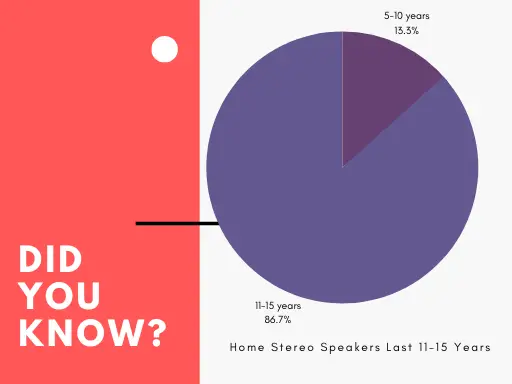
For some people, stereo speakers are not a necessity. But for a home music system with above-average sound quality, stereo speakers are a must. The home music system itself does give good audio quality. But there will always be some of us who prefer the true stereo sound.
Stereo speakers from JBL, Bose, and Sony have solid reputations. JBL stereo speaker models have a 10-year shelf life. Depending on how frequently you use it, the duration will vary.
Contrarily, a Bose speaker will continue to work flawlessly for at least 10 to 12 years. Current trends also favor all-in-one wireless speakers like the Sonos One Gen 2 and Apple HomePod mini. But under heavy use, Sonos speakers typically only last 5 years. So perhaps not the best choice in terms of longevity.
Now, there will always be a few of us who want authentic stereo sound. Therefore, the need to create an entirely immersive home theatre or concert experience will always exist.
How Long Do Wall Speakers Last?
Wall Speakers shouldn’t require any repairs for at least 13 to 16 years. With audio coming from all over the room, they give your sound a lot of depth. And if you’re using a high-end device like the Polk Audio RC80i, the experience is simply extraordinary.
Furthermore, without taking up any extra room, in-wall speakers give your decor a contemporary look. The choice between in-wall and on-wall speakers may be difficult for you. However, both of these ultimately belong to the category of home theatre systems.
Here’s a piechart of our survey –
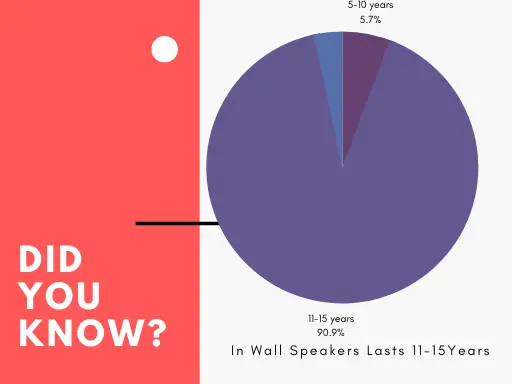
These can last even longer than 16 years if used carefully and with a reasonable level of sound. But because of technological advancement, they will run into compatibility problems, like theatre speakers.
How Long Do Ceiling Speakers Last?
Ceiling speakers last for 25 years. In the case of commercial use, such as in schools or auditoriums, it lasts about 15 years. Here’s the piechart of ceiling speaker longevity according to our survey –
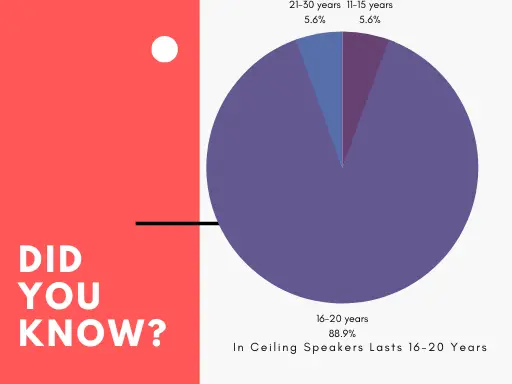
During their lifespan, they don’t frequently encounter many issues. However, if there are structural issues, such as mold or excessive dust, these won’t last as long.
With older speakers, certain components typically start to fail. These components are usually simple to replace. However, as time passes, it might get harder to find the necessary replacement parts.
When it comes to in-ceiling speakers, Polk Audio is among the top manufacturers. These speakers are versatile and can be used either individually or as a part of an existing home theatre setup. Polk Audio Speakers are expected to last for 15-20 years.
Klipsch’s R-1650-C ceiling speaker on the other hand is one of the best budget-friendly options. Similar to other Klipsch speakers, these are guaranteed to provide excellent audio for 15 to 20 years without experiencing any problems.
And if used sparingly, they can last up to 30 years. But remember to consider the speaker and sound system compatibility.
How Long Do Floor Standing Speakers Last?
Depending on the brand you use, the lifespan of floor-standing speakers is between 10 and 15 years. These Speakers are guaranteed to produce more scale, authority, and bass because of their larger cabinets.
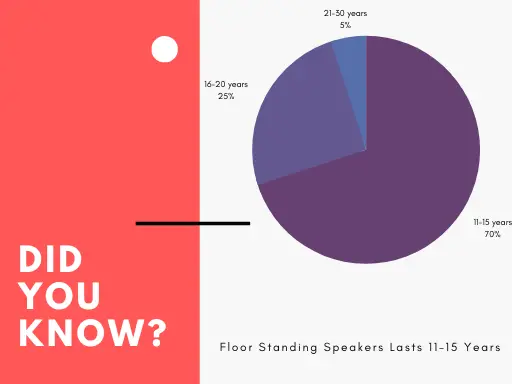
The highly regarded Triangle Borea BR08 floor-standing speakers are warranted to operate trouble-free for 10–20 years. Even low-powered amps should produce adequate volume levels due to their relatively high sensitivity. Some of these speakers even have a track record of lasting around 40 years.
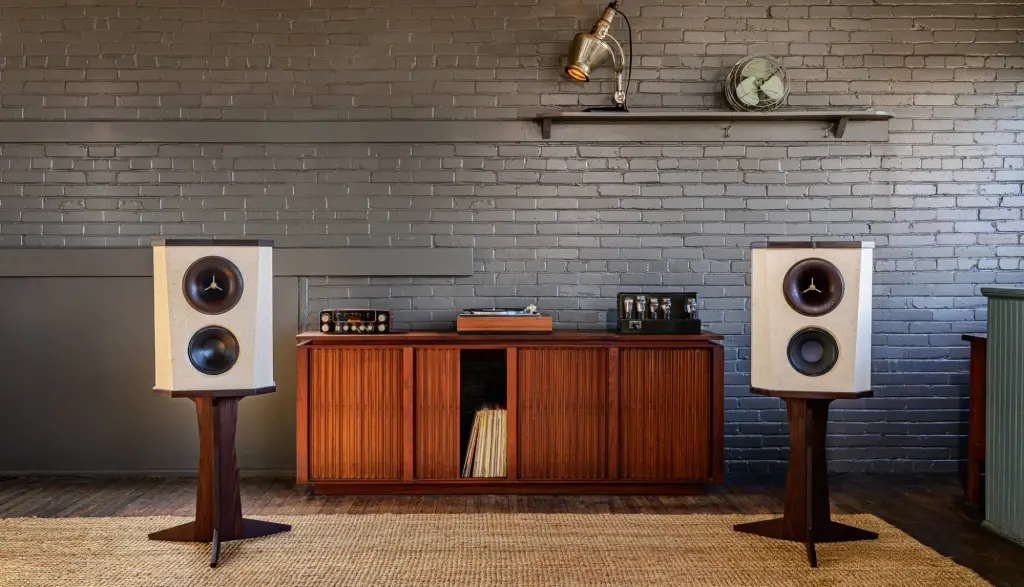
The Debut 2.0 F5.2 from Elac, on the other hand, offers excellent value for the money. They last for a minimum of 10 to 20 years. However, after 10 to 15 years, some of the components might need to be replaced.
How Long Do Surround Sound Speakers Last?
Depending on the brand, the lifespan of surround sound speakers could be anywhere between 10 and 15 years. Bose surround speakers with foam interiors begin to degrade after 10 to 12 years of use. Modern Bose speakers use rubber instead of foam because they last longer.
Here’s the survey piechart for surround sound speaker longevity-
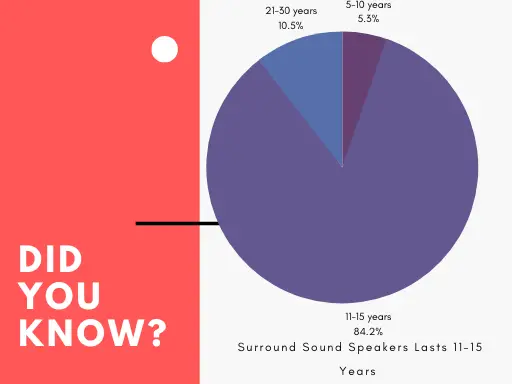
The lifespan of Dali Oberon’s surround sound speakers is 6 to 10 years. They offer free lifetime tech support if you run into any issues during these times. The sound produced by these Dali speakers is rich and warm, bringing out the best in any soundtrack.
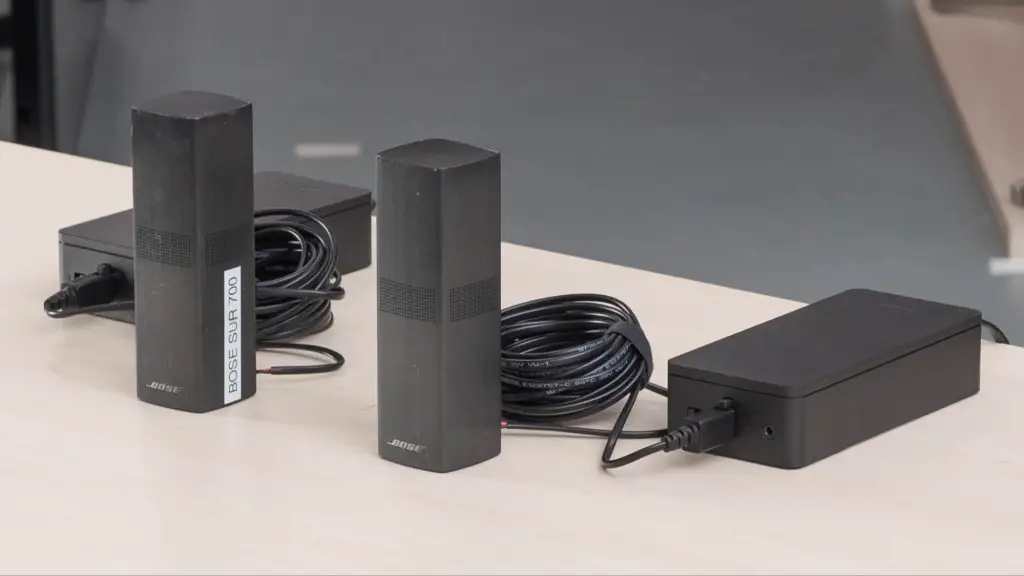
The Wharfedale Diamond 12.1 HCP, on the other hand, is arguably one of the best high-end surround sound speakers. These high-end speakers will not degrade for 20 to 30 years. These speakers produce sound that is full of impact, detail, and sensitivity.
How Long Do Soundbars Last?
Soundbars last anywhere between 6 and 16 years. You can expect these to last up to 7 years without needing maintenance or replacement. A passive soundbar from James or Leon, for example, can last for at least 16 years.
Here’s our survey response for soundbar longevity –
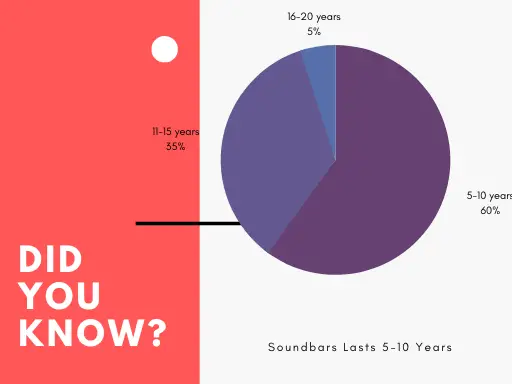
Built with numerous speakers they are well fit with the most recent technology. These are affordable and also quite fashionable options for home entertainment systems.
Vizio Soundbars are a great option if you have a limited budget; in particular, the Vizio V Series V51-H6 is a great choice.
These are guaranteed to last trouble-free for 3-5 years on heavy use. They can last 8 to 10 years with more moderate use.
However, you might need to spend some extra money on the Samsung HW-Q990B soundbar. But for 10–16 years, you can expect excellent audio service.
How Long Do Bookshelf Speakers Last?
The lifespan of bookshelf speakers is between 15 and 20 years. Some even last around 30 years, depending on the brand. These take really small places and can even be placed on a bookshelf. But don’t place them without making sure it is recommended in the manual.
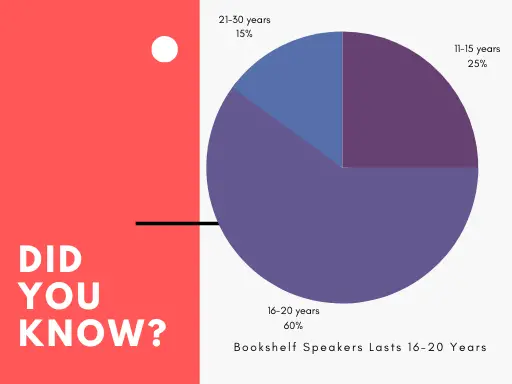
With a lifespan of up to 30 years, Bowers And Wilkins have the best bookshelf speakers. These speakers are more than capable of delivering an excellent sonic experience.
The KEF LS50 Meta model, on the other hand, is one of the best bookshelf speakers in the high-end range. On moderate use, they have a lifespan of 10–12 years.
Elac is another popular name in bookshelf speakers. This brand’s speakers have a 15-year shelf life with no significant issues.
Increasing the Longevity of Home Speakers: Speaker Maintenance
Each speaker is made uniquely from a variety of materials. The materials chosen are based on the available resources and the final cost of the speakers. These materials do not react similarly in the same environment.
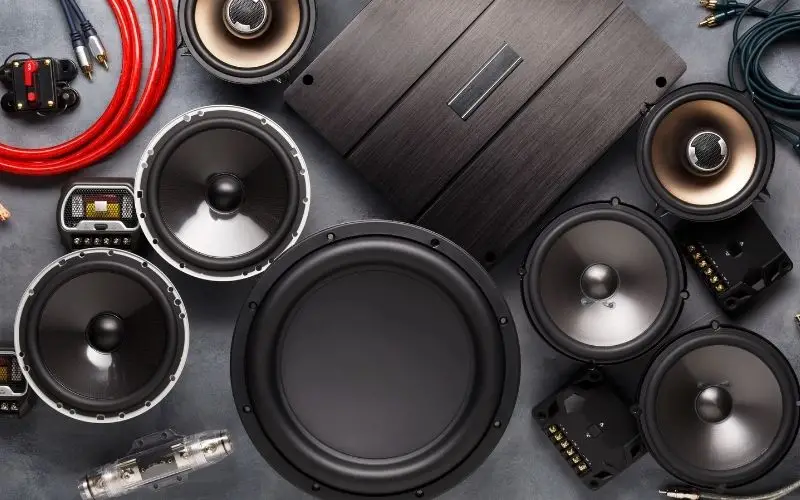
The foam that is used to make surrounds is sensitive to heat, water, and dust. So you need to check surrounds made with foam regularly for any dust buildup or moisture. You must keep them dust-free and clean them on a regular basis with a dry mop or vacuum cleaner. But surrounds made from Butyl rubber don’t face this problem.
So let’s investigate more elements that affect durability. And how to care for your speakers to provide long-term service?
Factors That Decrease the Longevity of Home Speakers
A number of different components can degrade over time and eventually lead home speakers to fail. We have put all these possibilities that decrease longevity into these couple of main factors. Let’s take a look-
Power & Connection
Your speaker will frequently pop or make crackling noises if the connection is loose. Repairing these loose connections is often as simple as gluing or tightening a connector.
However, if left unaddressed, these connections can cause harm to the entire circuitry of the speakers.
Abrupt power surges can severely harm your sound system. Your speaker cone will not vibrate in the midst of a power spike, such as lightning.
Instead, it will generate a push in one direction of the wire coil. If that direction is not followed, you will most likely end with a damaged speaker cone.
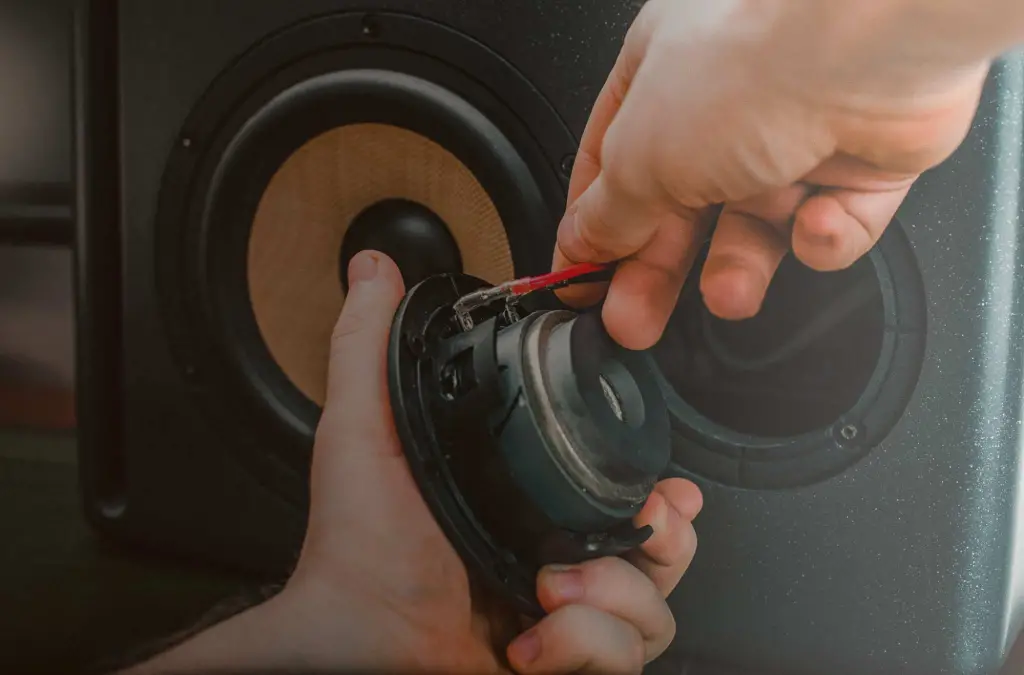
Materials Used
Usually, the surround of a speaker is the first part to break down. Butyl rubber and foam are the two primary materials used to make surrounds. Butyl rubber speaker surrounds last far longer than foam. It has a better temperature range and is significantly more flexible than foam. It’s also resistant to heat, water, and a variety of chemical reactions.
The majority of tweeters were filled with ferrofluid in the early 1990s.In tweeters, ferrofluid suppresses resonance and cools the tone coil. The voice coil is kept from overheating, which helps to improve sound quality overall.
Ferrofluid has the drawback of eventually drying out. A tweeter’s entire ferrofluid will evaporate after ten to twenty years. This is why manufacturers have stopped using them in speakers.
Speaker cones are often designed and built of plastic, paper, aramid fiber, and occasionally metal. Although these materials are durable, over time they may degrade due to specific environmental factors.
Cones made of aramid fiber, for instance, perform poorly in humid conditions. This is due to their ability to absorb moisture. Cones made of paper react similarly.
Environment
The biggest threat to speakers is undoubtedly dust. The electrical signals between sources and speakers are disrupted when dust gets within the wire connectors.
This causes your system’s audio to become noisier. Excess dust might damage wiring and loudspeakers in some circumstances.
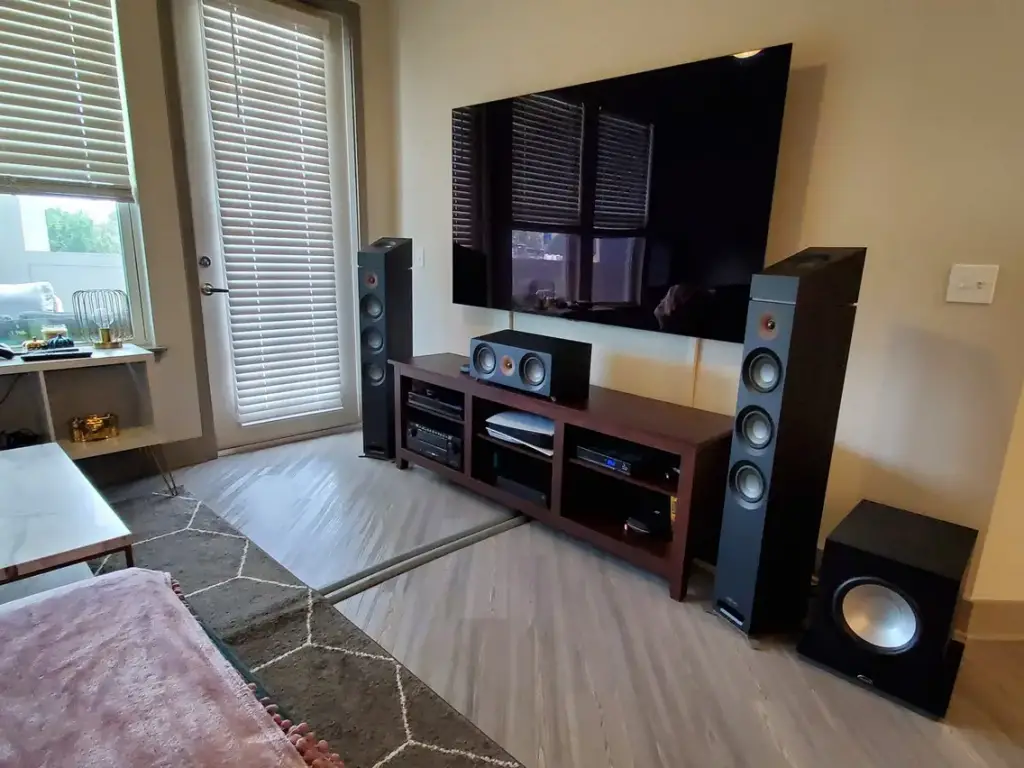
Generally, sunlight is not good for speakers. The sun’s UV rays harm the speaker cones and grill cloth over time. The speaker’s voice coil can also become overheated from direct sunlight. And it can overheat and burn while the speaker is working.
Humidity can also increase the degeneration of your speakers. Cones and their surroundings gradually deteriorate due to moisture.
The metallic components of the speaker could also rust. Moreover, moisture can result in a short circuit and can harm the power amplifier or speaker drivers.
The heat from radiators is another factor that might eventually degrade speakers. There is nothing wrong with using speakers inside a room that also has a radiator.
They should be fine as long as the radiator is not producing an excessive amount of heat.
However, many people put their speakers next to radiators. As a result, the speaker cabinets, cones, and surrounds might deform over time. And it will greatly impact how well the speakers sound.
Static electricity is also one of the speaker’s adversaries. Your system may actually burn down as a result of a buildup of static electricity.
Maintenance
Quality speakers have the ability to significantly improve the quality of your audio output. Quality does, however, have a price. As a result, when pricey speakers malfunction, you will regret not taking better care of them. Because, in the end, it all comes down to maintenance.
Even a low-cost speaker can survive a long time if properly maintained. Dust, debris, and moisture can easily jam your speaker. It requires cleaning on a regular basis.
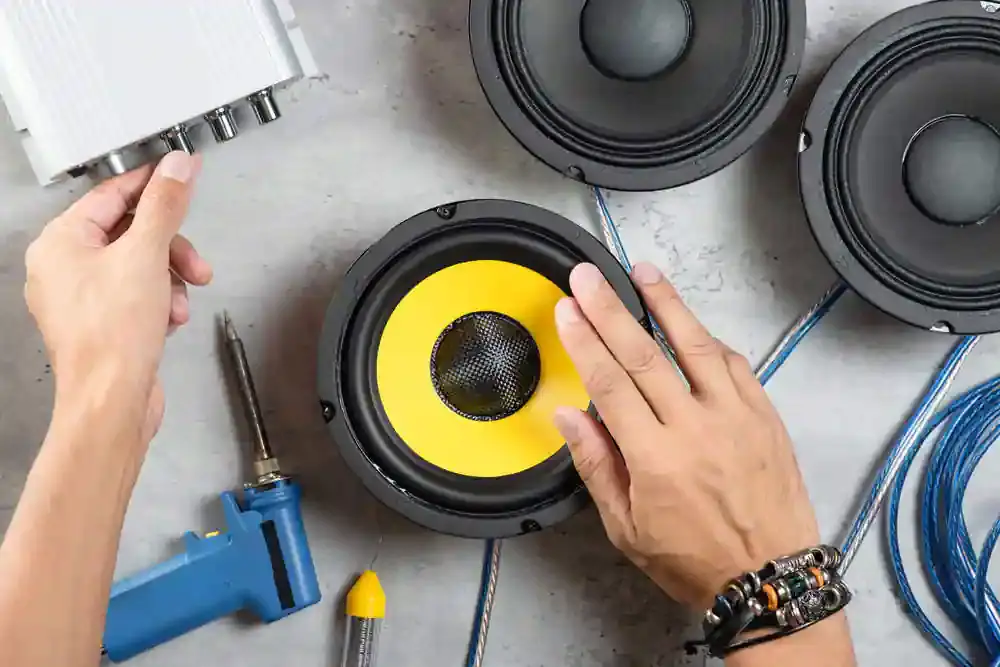
The speaker cones must also be checked on a regular basis to see if they are torn or not. Neglecting these can cause major damage to your speaker over time.
There will eventually be a decline in sound quality as well. And the speaker, which was supposed to last a decade, will barely last a few years. At times, you might even have to solve your speakers yourself.
Don’t fret as fixing an old speaker is not that difficult. But it’s better to take proper care and eliminate that DIY experience in the first place.
How to Do Home Speaker Maintenance
Loudspeakers require regular maintenance in order to perform well. Here are a few tips to ensure your loudspeakers continue to look and sound great
- To avoid dust, keep the speakers in a dust-free environment. You can clean your loudspeakers safely using dust pads, dry cloth, air canisters, and vacuum cleaners. Never use liquids of any kind on your speakers.
- Avoid placing loudspeakers in direct sunlight or next to windows. Exposure to the sun can harm the electromagnetic voice coil. Your loudspeakers should be placed at least a few inches away from walls and confined places. This ensures proper airflow in your system.
- Alternatively, bookshelf speakers can be set up on top of speaker stands, away from packed bookcases. Proper airflow enhances sound quality in addition to extending the lifespan of the speakers.
- Consider purchasing anti-static carpet floor mats as a preventative measure. Static air can accumulate to a potentially hazardous level in dry air, which acts as an insulator.
- It’s crucial to have control over how your system obtains power. Although passive loudspeakers are not directly powered, the audio source to which they are connected is. You can use Uninterruptible Power Supplies (USP) and Voltage Regulators to avoid unusual power surges.
FAQs
How Often Should Speakers be Changed?
Speakers typically last 10 to 20 years with proper care before needing to be replaced. There are a lot of variations in regard to quality, toughness, and longevity. Because there are so many distinct speaker kinds available the time may vary from one to another.
What Can Cause Speaker Damage?
Playing music at a high volume can be very harmful to speakers. High volume for a long time overheats the drivers and sometimes causes a mechanical breakdown. Speakers have power limits that, if exceeded, can burn or destroy the driver coil.
Final Words
That was all about how long do home speakers last. It all ultimately comes down to how the speaker is used and the speaker’s structural materials.
Regular speaker maintenance is also very important. It ensures the speakers’ longevity.
Hopefully, the aforementioned advice will be useful in keeping your speakers operating as long as possible.
Until next time!

